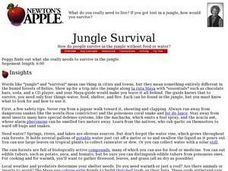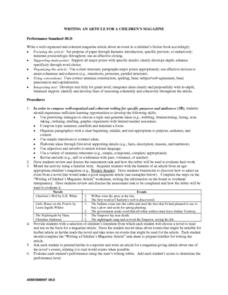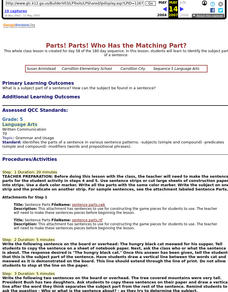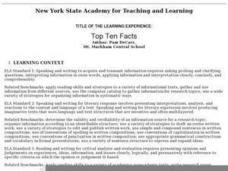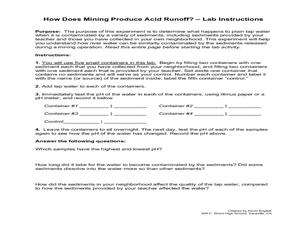Curated OER
Jungle Survival
Students make a chart with columns for water, food, shelter, fire, and other needs.Then list whatever each person thinks they might need in each column to survive for at least a week in the outdoors during that season.
Curated OER
Is Your Water Clean?
Students compare water quality of different sources. They test water samples for odor, phosphates, pH, bacteria, and dissolved solids. they fill out a data table and answer questions about their findings.
Curated OER
Where The Blue Fern Grows
Students discuss ancient plants and their adaption in the world. Students review forms of plant propagation. Given proper supplies and directions, students apply a variety of fern spores to peat pellets, monitor the growth, and...
Curated OER
WRITING AN ARTICLE FOR A CHILDREN'S MAGAZINE
Students engage in the writing of a magazine article. They focus upon the reading of a children's fiction book and create an informative narrative. They create main ideas and supporting details for the article. The supporting of main...
Curated OER
Simple Machines In Action
Students name and recognize six types of simple machines. They use their research to design an amusement park ride that features different types of simple machines. Students create a brochure about their ride and how it works. Simple...
Curated OER
Tree Hunt
Students identify the common trees of Iowa and make observations while creating a key. In this tree hunt lesson, students write a letter to the Iowa Department of Natural Resources to receive a pamphlet of Common Trees of Iowa. Students...
Curated OER
Volcanoes
Students explore the formation of volcanoes. In this earth science lesson, students build their own volcanoes in the lab using different materials. They identify the different types of volcanoes.
Curated OER
The Verb and Adverb Connection
Fourth graders use pantomine and charades to explore verbs and adverbs. They, in groups, play a variation of charades to act out sentences with adverbs showing WHEN and WHERE.
Curated OER
Parts! Parts! Who Has the Matching Part?
Fifth graders identify the subject part of a sentence. They receive randomly distributed teacher-made sentence parts. They have either a subject part of a sentence or the remainder of the sentence.
Curated OER
Planting the Seed
Students plant their seeds and collect and organize their own materials for planting. They also set up their planters with wicks, fertilizer, potting mix, and seeds. Finally, students write their names on planter markers with a ball...
Curated OER
US & Iroquois Constitution Parallels
Eighth graders identify and compare the stated purposes of the Iroquois and US Constitutions, and their roles as living documents.
Curated OER
Cultural Lit. 30: The Constitution & Native Americans
Students identify and consider United States Constitutional origins in American Indian culture.
Curated OER
Is Dilution the Solution to Pollution?
Students explore the different types of pollution. they conduct experiments using dye mixed with tap water to measure the levels of dilution. They discuss at what point the dye (pollution) would be diluted enough to be safe to drink.
Curated OER
Top Ten Facts
Students, in pairs, complete research about an assigned person. One student does research in the library and the other on the Internet. They come back together, compare their research, and compile a list of 10 main facts about their person.
Curated OER
Finding Simple Machines in Farm Machinery
Students identify simple machines and how they must work together to form a piece of equipment used in agriculture. They create a diagram of a piece of farm equipment and write about two of the simple machines they drew.
Curated OER
How Does Mining Produce Acid Runoff?
Students examine how mining and other industry operations can lead to acid runoff. In this mining lesson students study weathering and complete a lab on it.
Better Lesson
Better Lesson: Speaking, Listening and Writing Compound Contrasting Sentences
Young scholars will be answering text-dependent questions in which they will have to describe the differences between the different characters, settings, and major events in our stories using complex contrasting sentences. The students...


